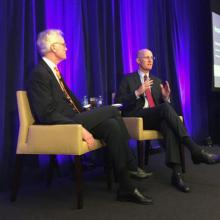racial diversity
Conversely, George W. Bush's administration in his first term had three men to every one woman, and two women served for every five men in the Obama and Clinton administrations.
Critical to the success of the movement is the fact that corporations are not simply tolerating activists such as Daly.
Instead, they increasingly see the socially responsible agenda as good business; and, perhaps more important, so do investment firms that are responding to the growing demand for portfolios that reflect a client’s values while also making money as effectively as any other investment.
This post originally appeared in The Week. Read the full post here.
Ridley Scott's Exodus has almost every ingredient necessary to make a holiday blockbuster: a timeless tale, killer cast, massive budget, pre-release media buzz, stunning special effects, and an impressive director. But if moviegoers look deeper, they'll notice one ingredient is painfully missing: melanin.
Scott's big-budget film takes place in North Africa thousands of years ago. In real life, everyone would have had dark skin. But the movie is populated by an almost completely Caucasian cast. Welsh-born Christian Bale stars as the Hebrew liberator, Moses. Australian Joel Edgerton plays Pharaoh, and American Sigourney Weaver was almost laughably cast as an African queen.
Vanity Fair notes that most of the actors of color who have been cast were relegated to nameless roles. (Exceptions may include smaller roles for Ben Kingsley, a Brit with an Indian father, and John Turturro, an Italian-American.) The Independent adds that black and ethnic minorities do appear in the cast as "Ramses servant," "Egyptian thief," and "Egyptian Lower Class Civilian."
We can't claim that Scott's casting decisions were pernicious. They are, however, historically inaccurate and, frankly, inexcusable for a film in 2014.
Sadly, Ridley Scott is hardly alone. Whitewashing Bible films is something of a Hollywood tradition spanning decades, and it won't change until audiences demand better.
The last time a live-action Moses appeared on the silver screen was in Cecil B. DeMille's The Ten Commandments." It starred a fake-baked Charlton Heston. But okay, that was 1956. Surely Hollywood's sensitivity to ethnicity has changed in the last half-century, right?
Wrong.
Read more here.
In a vote of 7-1 on Monday, the Supreme Court sent an affirmative action case, Fisher v. University of Texas, back to the lower court for a re-hearing, while reaffirming the benefits of diversity in institutions of higher learning and authorizing the continued use of race as one factor in admissions. By sending the case back to determine if the University of Texas could find no “available, workable race-neutral” alternatives available to them, Justice Ruth Bader Ginsberg explained the court did not issue a strong enough support for affirmative action. I agree. By virtue of our nation’s not-so-distant history, race simply is a factor that should be considered.
For nearly 250 years, blacks were bought and sold like cattle and carriages on auction blocks across America. When the Atlantic slave trade was outlawed in 1807, the U.S. bred slaves to reinforce the fundamental source of its wealth: free labor. When shackles fell from the wrists and legs of black men, women, and children — and the Reconstruction Era took hold — black families thrived and held public office. Then, for the next 80 years, thousands of white men in the South covered their faces with sheets, burned crosses, lynched 3,445 black men, women, and children, and instituted a web of laws that made it nearly impossible for blacks to vote, attain equal education, or own a home of much worth. At the same time in the North, blacks, Latinos, and Asians were redlined into urban ghettos where access to good housing, competitive education, adequate health care, effective law enforcement, and gainful employment was scarce.
When did this reign of terror against African-Americans end? The Civil Rights Act of 1964 and Voting Rights Act of 1965 outlawed so-called “Jim Crow” laws that had blocked blacks from voting and legally reinforced racial segregation. The acts laid the foundation for legal recourse against all manner of discrimination from that day to present.
Now consider this: We have made only two generations of progress after 17 generations of comprehensive, structural, systematized, and racialized oppression. And the effects of that oppression still haunt us today.
Every school day just after 2 p.m., Sandra pushes her cart into my classroom to clean the bathroom and empty the trash cans. She is the school custodian and my students love her. When students hear her squeaky wheels in the hallway outside our door, they listen for her kind giggle as she enters the room. "Ms. Sandra! Ms. Sandra! Can I help you empty the trash? Can I help you?" they yell out with their hands waving in the air.
She responds, "Jennifer, you look so cute today! How you doin' VicTOR? Francisco, baby, you look like you're doing a good job for Mr. Barton. You come on over and help me today. Anna, honey, that's okay, you can help me tomorrow." She knows all of my students by name.
At Wild Goose, I was humbled to be among justice-seeking Christians seeking to follow in the footsteps of Jesus.
I see a deep connection between the personal practice of simple living and activism for social change. While I struggle to live justly, particularly in my everyday purchasing decisions (as Julie Clawson advises!), I often don’t live as simply as I could. Sometimes I take shortcuts, going out for lunch, driving my car to work, or buying something to solve a problem that actually requires time I lack because of overcommitment.
As Mark Scandrette points out, for many of us, our slavery to time and money is a choice. We could cut much from our lives and live more simply. We are the global 1 percent.
It’s this voluntary reconsideration of wealth and rediscovery of our Christian justice tradition that made Wild Goose such an amazing experience.
Broadcaster Tavis Smiley and Princeton professor Cornel West just wrapped up their 18-city "Poverty Tour." The aim of their trip, which traversed through Wisconsin, Detroit, Washington, D.C., and the Deep South was to "highlight the plight of the poor people of all races, colors, and creeds so they will not be forgotten, ignored, or rendered invisible." Although the trip has been met with a fair amount of criticism, the issue of poverty's invisibility in American media and politics is unmistakable. The community organizations working tirelessly to help America's poor deserve a great deal more attention than what is being given.
The main attack against the "Poverty Tour" is Smiley and West's criticism of Obama's weak efforts to tackle poverty. For me though, what I would have liked to see more is the collection of stories and experiences from the people West and Smiley met along their trip. The act of collective storytelling in and of itself can be an act of resistance.





